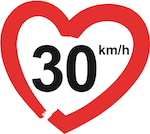The first 30 km/h zone ever was implemented in the German city Buxtehude, as a part of a pilote project investigating traffic calming measures.
Many German 30 km/h zones count at night times only.
| Bad Dürrheim | 12600 residents | 30 km/h in the whole municipality in 1989, first implementations in 1989 |
| Bad Wörishofen | 14.700 residents | Implementing 30 km/h in the whole city centre; lawsuit with superior administration in order to be allowed to. |
| Berlin | 3.452.900 residents | many zones with 30 km/h at night, pilote project to investigate reduction of traffic noise in 1999/2000; pilote project “Beusselstraße” (following residents´ lawsuit) |
| Bielefeld | 330.000 residents | 30 km/h in about half of all residential areas, trial planned with main roads; |
| Bodenmais | 3.300 residents | health resort, well-known for its healthy climate; 30 km/h in residential quarters was implemented after guests had complained repeatedly about speeding; 30 km/h extended to main roads since 2010 |
| Bremen | 548.600 residents | Wide parts of the city with 30 km/h limits; planning to more and more include main roads (24 sections under discussion) |
| Bremerhaven | 108.800 residents | several wide 30 km/h zones |
| Buxtehude | 39.800 residents | first 30 km/h zone ever, implemented in November 1983; exercised several comprehensive studies covering noise reduction, air pollutants, urban green, accidents, acceptance among business people |
| Denzlingen | 13.400 residents | 30 km/h in almost all areas, except main road. One road was reallocated in order to make implementation of 30 km/h possible (2013) |
| Dresden | 530.800 residents | 30 km/h zones in residential areas, pilot project for 30 km/h on main roads, interesting scientifical studies |
| Freiburg | 220.300 residents | 30km/h in residential areas was implemented in 80-ies and 90-ies; 400 km of the 580 km network are 30 km/h zones; new: extension to nearly all main roads under discussion |
| Göttingen | 117.000 residents | 30 km/h in the city centre, additionally on 8 main roads; a pilot project with 30 km/h in the whole municipality currently under discussion (legal problems due to German legislation) |
| Hamburg | 1.746.300 residents | first concept for 30 km/h in 1983, 500 zones with 30 km/h already in 1987 |
| Hannover | 518.400 residents | 30 km /h in the whole city centre, implemented in 2009 |
| Heidelberg | 152.100 residents | 30 km/h in residential areas since mid-90ies |
| Herzogenrath | 46.500 residents | 30 km/h in all residential areas, introduced in 1991 |
| Hilden | 54.800 residents | 30 km/h in all residential areas, introduced in 1991 |
| Karlsruhe | 299.100 residents | vast areas of the city with 30 km/h zones (about two thirds) |
| Köln | 1.034.200 residents | first major city in Germany with more than 50% of the municipality with 30 km/h zones |
| Magdeburg | 231.000 residents | introduction of numerous 30 km/h zones since about 1995 |
| Marburg | 72.000 residents | 30 km/h in the whole city, start in 2012 |
| Memmingen | 41.800 residents | first seven zones with 30 km/h implemented in 1986; today 23 zones including the whole historic centre |
| Meschede | 30.100 residents | 30 km/h in the whole city centre, introduced in September 2013 |
| München | 1.407.800 residents | 1988 first zone with 30 km/h (“Siedlung am Lerchenauer See”), about 80% of road network with 30 km/h in 2012 (with 30% of the traffic) |
| Münster | 299.700 residents | 30 km/h in all residential areas (> 150 areas, 75% of the road network); main roads not included |
| Neuenburg am Rhein | 12.042 residents | 30 km/h on all urban minor roads, roundabouts and traffic-calmed streets, where children are allowed to play, were set up to ensure compliance |
| Plankstadt | 10.000 residents | good results after implementation of 30 km/h on the main thoroughfare, the main road was downgraded to local road in order to make the measure possible |
| Solingen | 155.800 residents | 30 km/h in various residential areas |
| Stuttgart | 604.300 residents | 30 km/h on ab. 85% of residential roads, plus on a main road (Schickhardstraße and Schwabtunnel) |
| Ulm | 119.200 residents | 30 km/h in several parts of the city |
| Wernigerode | 33.500 residents | 30 km/h on all residential roads of the city centre, inclusion of main roads planned |
| Winterberg | 12.800 residents | 30 km/h in the city centre and on thoroughfares of neighbouring communities, pilote project in 2013 |
| Wülfrath | 20.900 residents | 30 km/h in the city centre |
| Wuppertal | 345.000 residents | 30 km/h on two thirds of the city, mostly implemented after 1992 |


